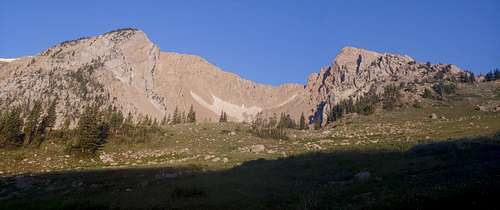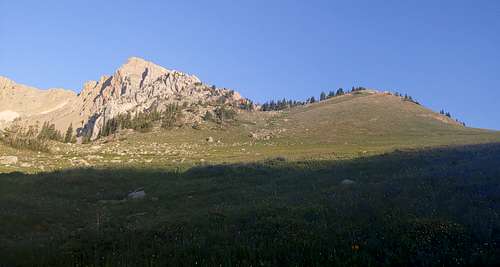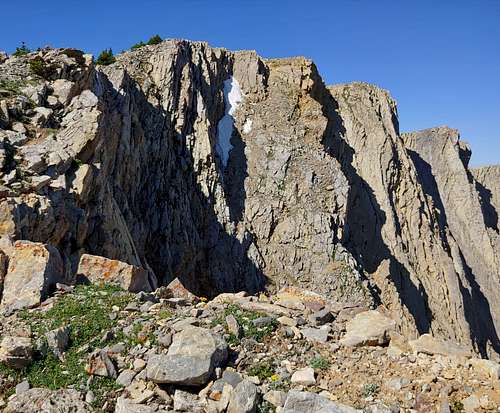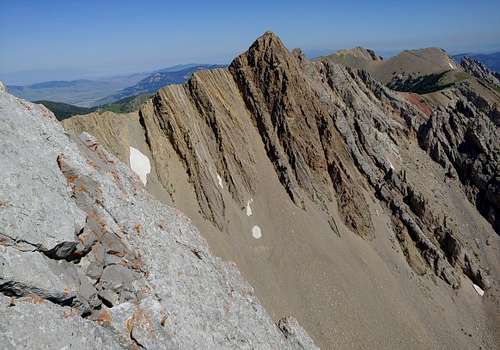-
 4845 Hits
4845 Hits
-
 77.48% Score
77.48% Score
-
 8 Votes
8 Votes
|
|
Mountain/Rock |
|---|---|
|
|
45.91508°N / 110.98049°W |
|
|
Mountaineering, Trad Climbing, Scrambling |
|
|
Summer |
|
|
9017 ft / 2748 m |
|
|
Overview
A prominent but little-known feature on Hardscrabble Peak, the Bone Saw has two 4-pitch routes that end an easy walk from the summit.
One route is bolts/trad and the other is pure trad, and they go at 5.6 and 5.5, respectively. For the purposes of this page, though, I will treat the two routes as one since (1) they converge and (2) some of the trad pitches are on pure limestone choss with little meaningful protection. There are, however, some cracks that seem good enough for cams; just don't fall. ;-)
If you are not a new leader and if you are comfortable with choss and long runouts, you will love climbing the Bone Saw, as it is in a beautiful alpine setting. The Bridger Range is a small one, but it is exceptionally pretty.
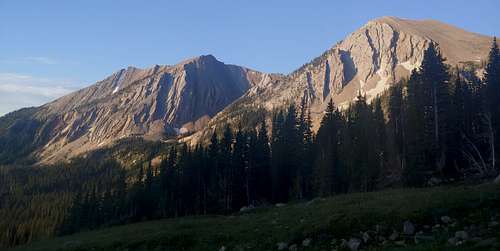
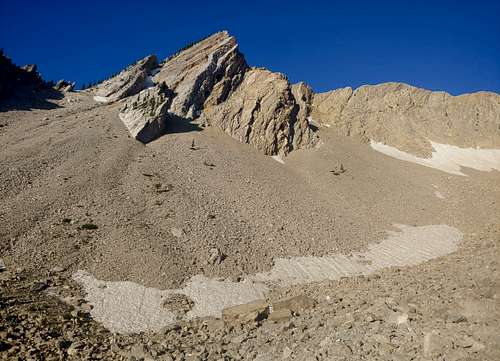
Getting There
From your location, get to MT 86; its southern end is near Bozeman, and its northern end is on U.S. 89 south of White Sulphur Springs.
Around MP 21, turn onto a road signed for access to Fairy Lake. Follow signs for Fairy Lake and drive about 6 miles to two obvious campsites on the left side of the road. Just past the sites and on the other side of the road is a trail heading up a meadow; that is the start of the approach.
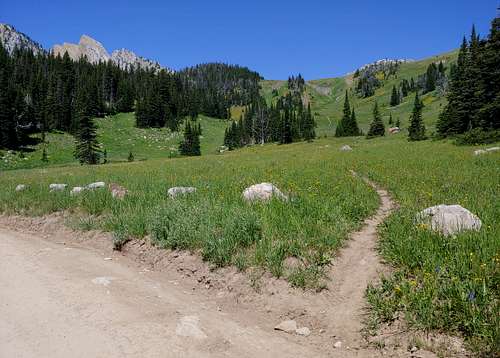
Route
Hike the trail uphill. As the trail approaches a saddle and the Bone Saw comes into view, leave the trail and cross-country to the basin below the Bone Saw. Hike up tedious talus to the base of the formation. For most people, the approach will be 60-90 minutes.
The Mountain Project page lists two routes-- EZ Direct (5.6) and Original Route (5.5). The former goes up the slabby face for two pitches before joining the latter, which follows the arete on the right.
Most likely, you will see how chossy the arete is and opt for bolts where they exist, which is why I am not going into detail about the two routes; EZ Direct is probably the way most will climb this peak.
P1-- 5.5. Climb slab and clip some bolts en route to bolted anchors. According to my notes (ATMN), there were 4 bolts and then bolted anchors.
P2-- 5.6. More slab and then a crack leading to bolted anchors. ATMN, 4 bolts and 2 cam placements before the anchors.
P3-- 5.5. All trad, mostly following an obvious crack system. Bolted anchors on a large ledge.
P4-- 5.4. Head up on the right side of the ridge and pull onto the ridge to clip a bolt. Now head up easy ground to bolted anchors; I placed a Tricam just to be honest but probably didn't need to.
I solo-led this route and used an 80m rope. Some pitches were a little too long to rappel on two strands, leading me to say that one needs at least a 50.
To descend, you can rappel the route if you have two 50s or longer, but you would have to leave slings and biners behind since the anchor bolts are not rap bolts, and you would be missing out on a chance to get more from your day.
The summit of Hardscrabble Peak is just a few minutes away and worth visiting. From the summit, hike south on a trail, sometimes faint, for about 1.5 miles to a saddle below Sacagawea Peak, the highest peak in the Bridgers. Here, there is an obvious trail junction, and from it hike east and downhill about another 1.5 miles to the Fairy Lake trailhead and campground. After that, hike up the road 10 minutes or so back to your starting point.
Red Tape
Nothing special; read and follow posted regulations.
When to Climb
Late spring through early fall.
Camping
Camp at Fairy Lake, the sites by the approach trail, or in dispersed sites.


